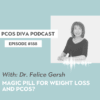Notes From The Cutting Edge: PCOS Research at ASRM
 PCOS Divas are always wondering where to find a good doctor who understands PCOS. In my experience, I found that aside from naturopathic doctors, reproductive endocrinologists seem to be the most knowledgeable about PCOS and its treatment. So, when I was invited to attend the American Society of Reproductive Medicine Conference (ASRM), I jumped at the chance because I knew that many of the most well-known endocrinologists in the country would be there.
PCOS Divas are always wondering where to find a good doctor who understands PCOS. In my experience, I found that aside from naturopathic doctors, reproductive endocrinologists seem to be the most knowledgeable about PCOS and its treatment. So, when I was invited to attend the American Society of Reproductive Medicine Conference (ASRM), I jumped at the chance because I knew that many of the most well-known endocrinologists in the country would be there.
What is ASRM?
For those who aren’t familiar with ASRM, it is an organization “dedicated to the advancement of the science and practice of reproductive medicine. The society accomplishes its mission through the pursuit of excellence in education and research and through advocacy on behalf of patients, physicians, and affiliated health care providers.”
Their annual conference is the one for reproductive endocrinologists to present their latest research (including PCOS research), so I was excited to attend and hear about the cutting edge of the reproductive science. It was an opportunity to learn, first hand, exactly what the experts are discovering about PCOS. Knowledge is power, you know!
I attended as many of these events related to PCOS as time allowed, and now I bring the highlights to share with you.
New Experts Joining PCOS Diva Podcast
*I had the opportunity to sit in on a Roundtable with Rashmi Kudesia, M.D. of Albert Einstein College of Medicine. Dr. Kudesia had scoured the existing research on PCOS and menopause and presented her findings. She came to the conclusion that women with PCOS at menopause have no greater risk for cardiovascular mortality and metabolic syndrome than their non-PCOS counterparts. I’ve asked Dr. Kudesia to present her complete findings on an upcoming PCOS Diva podcast episode, so keep an eye out.
*Frank Gonzalez, M.D. from Indiana University School of Medicine presented an oral abstract entitled “Suppression of nutrient-induced inflammation with a non-steroidal anti-inflammatory agent ameliorates ovarian dysfunction in lean insulin-sensitive women with PCOS.” It is good to see more studies being done on PCOS and inflammation. Dr. Gonzalez looked at the use of salsalate, an anti-inflammatory drug designed to help inflammation in women with PCOS. His study found that suppression of inflammation reduces ovarian androgen secretion and induces ovulation. Dr. Gonzalez has also agreed to join me on the PCOS Diva podcast to discuss his PCOS research findings.
One of the longer presentations about ovulation inducers was chaired by a top PCOS researcher. During the Q&A, a London doctor asked a question about the use of Inofolic (a very popular myo-inositol product available in Europe) to aid in ovulation induction. The presenter had no idea what this product was, and people in the audience had to explain it was myo-inositol. The researcher then laughed and dismissed myo-inositol as having no research to support its efficacy.
I was stunned. I had a folder full of inositol research in my bag, and after the session, I introduced myself and showed the doctor the research studies. He admitted that he knows about these studies, but declared that none are large enough to be significant. He went on to say that he would be happy to conduct a large study but “who is going to pay for it?” Here lies the dilemma.
There were lots of doctors in attendance at this session who heard from a respected mentor that myo-inositol is not an advisable therapy. There is positive research, but apparently not enough for the medical establishment to recommend its usage. However, despite the positive results in small studies, there is no means to fund a large study because no pharmaceutical company is willing to fund such a study. Why? Vitamin supplements can’t be patented, so there is no incentive for companies to fund these expensive large-scale studies.
I also heard repeatedly during the conference that “lifestyle intervention should be first line therapy.” Yet presenters admitted that there has been very little research done on lifestyle intervention and PCOS. Again, there seems to be little funding for this very important research. It has come to the point that lifestyle related research has to be crowdfunded like this recent UCSF PCOS diet study.
I will admit that I left the conference concerned and frustrated, feeling like progress in treating PCOS is limited by pharmaceutical companies that are more interested in selling drugs than doing what is best for women.
Summary of PCOS-Related Research Presented at ASRM
PCOS and Inflammation
- Researchers are confirming what we at PCOS Diva already know – PCOS is a pro-inflammatory state
- Inflammation and hyperandrogenism are worse in obese PCOS patients
- Inflammation directly stimulates ovarian dysfunction independent of insulin resistance and excess adiposity (obesity)
Thyroid
- TSH levels of greater than 2.5mlU/L were not associated with an increased risk of pregnancy loss when compared to women with TSH of less than 2.5mIU/L
- Presence of anti-thyroid antibodies is not associated with pregnancy loss.
Bone Health
- Women with PCOS could have an advantage concerning the risk of osteoporosis.
- PCOS women who are younger than 30 as well as post-menopausal women are protected from bone loss.
Pregnancy and Lifestyle (not specifically a PCOS study)
- Daily multivitamin use reduces risk of pregnancy loss
- Female and male caffeine consumption greater than 2 beverages a day increases miscarriage.

Ovulation inducers
- Letrozole has a higher pregnancy and live birth rate than Clomid and should be the first line pharmaceutical agent for ovulation induction in women with PCOS. Doctors mentioned initial dosage should be 2.5 mg and increase to 5mg if the woman doesn’t ovulate in first cycle. Letrozole is generally safe and well tolerated.
- Clomid with metformin seems to lead to a higher pregnancy rate than either clomid or metformin alone.
- Follicle Stimulating Hormone (FSH) is an effective treatment, but with a potentially higher multiple pregnancy rate. Is considered a second line treatment.
- Lean PCOS women require lower doses of gonadotrophins as compared to obese women. Starting dose should be 37.5 IU/d to allow the development of (optimally) a single follicle.
- Meta-analysis shows Laparoscopic Ovarian Drilling and gonadotropin induction equally effective. These should be recommended as a second line therapy.
- Laparoscopic Ovarian Drilling – Lean women have 1.4 times increased ovulation rates and 1.7 times increased pregnancy rates compared to obese women.
PCOS Symposium
Highlights from the PCOS Symposium, “Personalizing Treatment of PCOS in the 21st Century” chaired by Anuja Dokras, M.D, Ph.D. from Penn PCOS Center.
- Adolescents
- Should not be given a PCOS diagnosis if they began having a period less than 2 years ago
- Weight and insulin resistance should not be diagnostic criteria for an adolescent.
- To prevent misdiagnosis, they should be identified “at risk” for PCOS.
- Adults should be diagnosed via Rotterdam Criteria (having any two of the following three).
- Oligo-ovulation or anovulation
- Clinical or biochemical signs of hyperandrogenism
- Polycystic ovaries on ultrasound
- In perimenopause, PCOS women with ovulatory cycles increase from 52% to 85%.
- PCOS alone is not an indication for statin treatment.
BMI and Obesity Risks
- There seem to be race phenotypes of PCOS. African American women with PCOS compared to Caucasian women with PCOS, have a 40% rate of metabolic syndrome compared to 22.5% for Caucasian women. The average BMI is higher for African American women too, 72.7% greater than 30 BMI vs. 51.7% greater than 30 for Caucasian women. Chinese women have an average BMI of 23.
- Insulin sensitivity decreases with increasing BMI.
- Obesity has a significant impact on PCOS symptoms.
- Obese women with PCOS demonstrate lower success with infertility treatments.
- Weight loss helps to improve fertility and metabolic outcomes.
- Obesity strongly contributes to inflammation and PCOS.
Lean women with PCOS:
- 75% are insulin resistant.
- If BMI is less than 25, women with PCOS have no increased risk of pre-diabetes or type II diabetes.
- Lean women have fewer reproductive and especially metabolic problems – type 2 diabetes is predominantly (if not exclusively) a feature of obesity.
- Hormonal contraceptives worsen minimally/moderately glucose tolerance in lean women.
- Metformin has little or no effect on insulin sensitivity in lean PCOS, but it may improve the outcome of infertility treatments in lean women.
- Lean, infertile women seem to respond better to ovulation induction.
- Increased LH levels are more common in lean PCOS phenotype compared to non-lean PCOS.










I am disappointed in the focus on pharmaceuticals/allopathic approach rather than healing. PCOS isn’t random, it has a cause and in many cases focusing on fixing the imbalances behind the cause will bring healing. Pharmaceuticals will only further disrupt mineral balance, the entire foundation of metabolic processes.
Wow, I am disappointed in what that symposium said about Lean PCOS. From everything I have looked into, insulin resistance itself is a huge risk increase for pre-diabetes and diabetes, and yet to say that the Lean PCOS population has no increased risk for diabetes while saying that they are predominantly insulin resistant makes no sense. I also find it odd to hear them say that metformin has “little or no” effect on insulin sensitivity in Lean PCOS women. Metformin worked dramatically on my insulin resistance, and anecdotally for many women that I have met through the SoulCysters forum. Maybe it’s because metformin seems to be taken and proscribed mostly for ovulation and fertility reasons, rather than insulin resistance.
Actually, we don’t know the cause. Most scientists have a suspicion that it is genetic, but “Some clinical genetic studies have pointed to an autosomal dominant inheritance while others showed that it was more likely that the syndrome is a complex trait with oligogenic basis.” http://www.ncbi.nlm.nih.gov/pmc/articles/PMC2776334/
Yes, we have a metabolic condition with a hormonal imbalance, but as to why we have those imbalances right now is still under investigation. This is why there is still not a magic formula that can cure it all for all women (not to mention that it manifests itself in different symptoms).
i agree becky. there are mineral imbalances behind most, if not all, diseases, and pcos is one of them. i went to dr. anuja dokras myself and while she was wonderful, she was unable to give me a definite diagnosis of pcos, even though i have not menstruated in a year and a half. i do not fit the “criteria” for pcos, so i began doing my own research, looked into mineral imbalances and found out through a hair test that i have multiple heavy metal toxicities, one of them being mercury and one being copper. aluminum has an effect on the pituitary and thyroid and copper affects the entire endocrine system. i also found out that i have chronic lyme disease and two coinfections—all of which can wreak havoc on hormones. my point? there are SO many underlying reasons for hormonal imbalances, and while inflammation is one of them, we have to ask ourselves, where does this inflammation come from and why do some people have a greater susceptability to it? thats where minerals and metals and toxins come into play. i think that pcos research NEEDSSSS to place a greater focus on exploring these other imbalances, rather than over-medicating women with pharmaceutical drugs.
That’s because everyone is looking in the wrong places. 😉
Copper dysregulation has a huge impact on hormones, especially estrogen dominance. But you don’t see that talked about in medical journals. The large majority of doctors don’t even know what that is. All enzymes that make up metabolic processes are dependent on minerals. If you’re deficient in minerals or have metal toxicity then it’s not going to function properly. These are the causes behind PCOS (whether genetic or not).
Sorry, but I choose to no longer buy into the idea that we’re doomed to suffer this the rest of our lives. That’s all that allopathic medicine offers. Drugs make them money. And those drugs create imbalances in our bodies. For example, metformin will raise homocysteine and lower B12 and folate. This is bad for many reasons but particularly bad for people with MTHFR, which is a good 50%+ of the population. Not to mention how important folate is for progesterone balance. We should be fixing the imbalances, not creating new ones.
Absolutely Julie – I too recently had a hair analysis and found I was high in copper – I do think there is a link with excess copper and PCOS.
Agreed Becky! It is about getting to the root cause. I think MTHFR is a big issue for many of us and many doctors don’t even know what it is!
It is very disappointing. I find that the Naturopathic community and functional/integrative medicine community are light years ahead of mainstream medical when looking at and treating PCOS.
shock me as well. although I didn’t take metformin before as a lean pcos, but I do get better when taking Inositol. Inositol worked on my IR. I’M VERY LEAN.
what about taking muti-vitamins and inositol. cause I don’t know what i’m missing.
If you use facebook at all, there are a couple groups I recommend that can help you sort out what to take. I’m a little wary of multis and inositol. Inositol is closely related to phytic acid (inositol hexakisphosphate), which if you’ve done any reading about paleo or similar diets, it can bind to minerals in the gut and prevent absorption of them. There’s no way to make sure that your supplement has no phytic acid in it.
https://www.facebook.com/groups/mineralmavens/
https://www.facebook.com/groups/HolisticPCOS/
This post is worth everyone’s attention. Good work.. Supplements Online